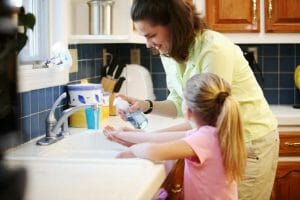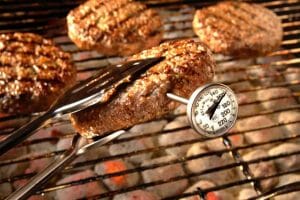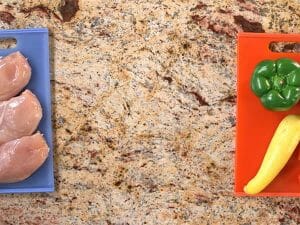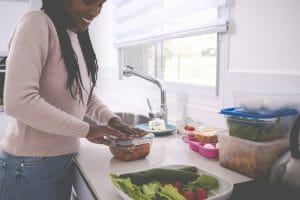Families are doing more grilling this year. Nielsen reported that fresh meat alternative sales increased 255% in the last week of March (compared to the same week in 2019), fully outpacing the growth of meat sales, which increased 53% over the same period.
Fight BAC! is here to help you out with a few essential tips on handling meat safely, and how grilling safely at home can keep you and your family healthy.
Clean hands & surfaces
Washing your hands and surfaces the correct way will help reduce the risk of harmful germs:
- Wash your hands with warm water and soap for at least 20 seconds before and after handling food.
- Wash your cutting boards, dishes, utensils, and counter tops with hot soapy water after preparing each food item and before you go on to the next food.
- Do not rinse raw meat or poultry before cooking it. This is not a safety step, and it could spread dangerous germs around your kitchen.
Thawing meat
 You may be buying more meats in bulk right now and freezing for later use. Make sure to thaw meats properly:
You may be buying more meats in bulk right now and freezing for later use. Make sure to thaw meats properly:
- Never let raw meat, poultry, eggs, cooked food or cut fresh fruits or vegetables sit at room temperature more than two hours before putting them in the refrigerator or freezer (one hour when the temperature is above 90°F).
- Never thaw food at room temperature. Food must be kept at a safe temperature during thawing.
- There are three safe ways to defrost food: in the refrigerator, in cold water, and in the microwave. Food thawed in cold water or in the microwave should be cooked immediately
Marinades
Everyone loves a good marinade! Make sure to safely marinate and store your meat:
- Always marinate foods in the refrigerator, not on the counter or outdoors.
- Don’t use sauce that was used to marinate raw meat or poultry on cooked food.
- Reserve a portion of the unused marinade to use as a sauce.
Grilling temps
 When it’s time to grill the food, cook it to a safe internal temperature for safety and quality. Use a food thermometer to be sure!
When it’s time to grill the food, cook it to a safe internal temperature for safety and quality. Use a food thermometer to be sure!
- Beef, pork, veal and lamb (roast, steaks and chops): 145 °F with a three-minute “rest time” after removal from the heat source
- Ground meats: 160 °F
- Poultry (whole, parts or ground): 165 °F
- Eggs and egg dishes: 160 °F, but cook eggs until both the yolk and the white are firm; scrambled eggs should not be runny
- Fin fish: 145 °F
- Shrimp, lobster and crabs: flesh pearly and opaque
- Clams, oysters and mussels: shells open during cooking
- Scallops: milky white, opaque and firm

Avoid cross-contamination
 Cross-contamination is how harmful bacteria can be spread. Improper handling of raw meat, poultry or seafood can create an inviting environment for cross-contamination:
Cross-contamination is how harmful bacteria can be spread. Improper handling of raw meat, poultry or seafood can create an inviting environment for cross-contamination:
- Never place cooked food on a plate that previously held raw meat, poultry or seafood.
- Use one cutting board for fresh produce and a separate one for raw meat, poultry and seafood.
- Be sure to have plenty of clean utensils and platters on hand.
Leftovers
After the meal, remember to handle leftovers safely to prevent foodborne illness:
- Plan on enough storage space in the refrigerator and freezer. In the refrigerator, air needs to circulate to keep the temperature at 40 °F or below. Use an appliance thermometer in your refrigerator to monitor the temperature.
- Divide large amounts of leftovers into shallow containers for quicker cooling in the refrigerator.
- Leftovers stored in the refrigerator should be consumed within 3-4 days
- Reheat leftovers to 165 °F before eating.
 To help you Fight BAC!® (harmful bacteria) this grilling season, we’ve collected five grilling recipes with built-in food safety and hand hygiene steps.
To help you Fight BAC!® (harmful bacteria) this grilling season, we’ve collected five grilling recipes with built-in food safety and hand hygiene steps.
Check out food safety videos on grilling and safe food preparation on the Food Safety YouTube channel.
Have a happy and safe grilling season!
Shawnte Loeri is the Communications Associate with the Partnership for Food Safety Education. She can be reached at sloeri@fightbac.org.